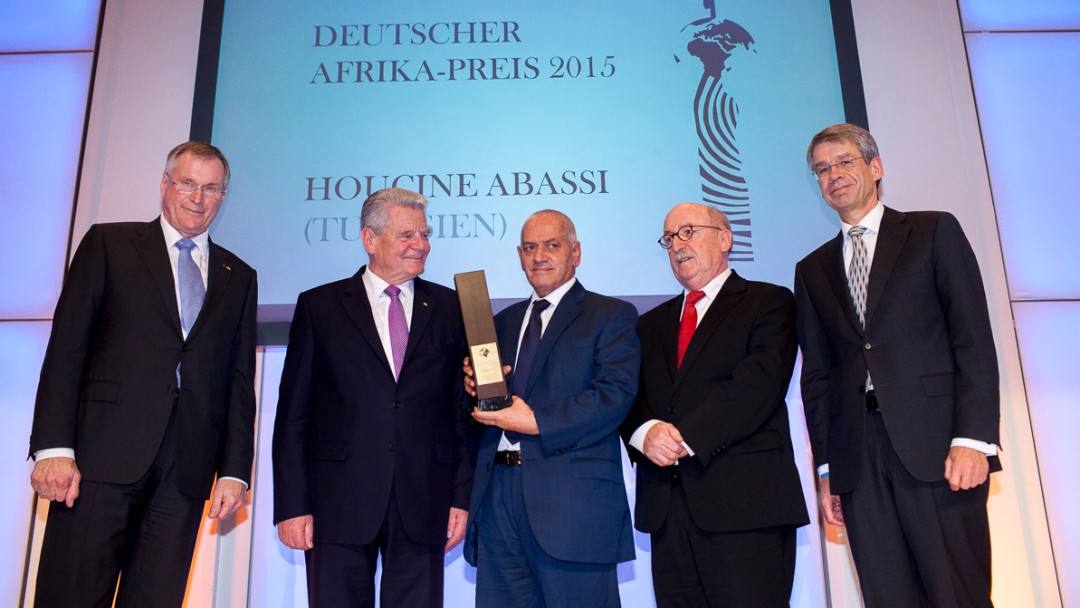News from 2015-11-25 / KfW Development Bank
A Man of Dialogue and Compromises
Gauck honours designated Nobel Peace Prize Laureate Abassi
Joachim Gauck, President of the Federal Republic of Germany, presented the German Africa Prize 2015 to the designated Nobel Peace Prize Winner Houcine Abassi at KfW's Berlin branch. In the historic banking hall, the Tunisian trade union leader received the award, bestowed in recognition of "his outstanding role in solving the political crisis that followed the Tunisian revolution", to quote the words of the jury. In his laudation Gauck praised Abassi's achievements, stressing the need for many more "men and women who place their faith in dialogue and compromise – not in dictatorial rule and the use of force".
Houcine Abassi, Secretary General of the Tunisian UGTT trade union movement, is regarded in his home country as the "father of national dialogue". He contributed significantly to ensuring that a political crisis in Tunisia in 2013, about two years after the start of the Arab Spring, did not end in political violence and chaos, but was solved peacefully.

Tunisia stood at a crossroads
At that time Tunisia stood at a crossroads. There had been assassination attempts and attacks, demonstrations by police officers against the government, and the population was growing increasingly frustrated. When the country was at risk of descending into chaos, Abassi was instrumental in the foundation of the National Dialogue Quartet, comprising the Tunisian General Labour Union, the Tunisian Confederation of Industry, Trade and Handicrafts, the Tunisian Human Rights League and the Tunisian Order of Lawyers. Together with his fellow campaigners in the other organisations, Abassi made a key contribution to finding a non-violent solution to the crisis. "It was you who kept on calling for peaceful dialogue. And it was you who first brought the government of the day, the opposition and the constituent assembly together at a single table", Gauck went on to underline.
The Africa Prize jury was impressed by Abassi's exceptional ability to "initiate dialogue, through the fine art of listening and without ambitions for political office, that resulted in acceptable long-term compromises", emphasised its chairman Dr Volker Faigle, board member of the German Africa Foundation. When the jury arrived at its decision in March, nobody could have guessed that "seven months later the Nobel Prize Committee would also select our preferred prize winner and, together with him, honour the National Dialogue Quartet with the Nobel Peace Prize", Faigle said.
Political solutions for difficult challenges
On behalf of KfW in its role as host, Dr Norbert Kloppenburg, member of the Executive Board of KfW Group, underscored Abassi's commitment and stressed the fact that the peaceful transformation of Tunisia was a shining example and an "encouraging sign that political solutions can indeed be found for complex and very difficult challenges". He added that the involvement of citizens and good governance were also decisive factors in the success of the development projects promoted by KfW.
The German Africa Prize is awarded annually by the German Africa Foundation. The foundation honours outstanding African personalities who contribute in a remarkable way to democracy, peace, human rights, art and culture, economic development and social issues with courage, commitment and integrity.
The members of the jury include: representatives of the Office of the Federal President, the German Federal Foreign Office, the German Federal Ministry for Economic Cooperation and Development, KfW, the German Institute for International and Security Affairs, the German Development Institute and the Association of German Chambers of Commerce and Industry.

Share page
To share the content of this page with your network, click on one of the icons below.
Note on data protection: When you share content, your personal data is transferred to the selected network.
Data protection
Alternatively, you can also copy the short link: https://www.kfw-entwicklungsbank.de/s/enzBWrMC.BMSA
Copy link Link copied